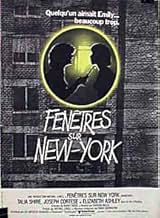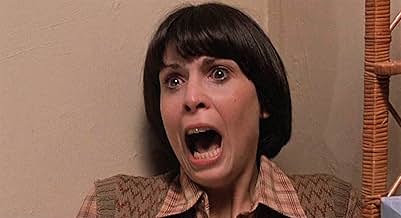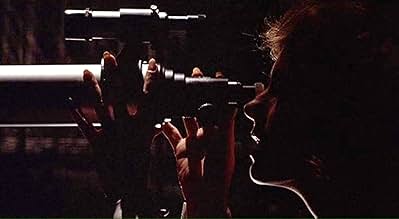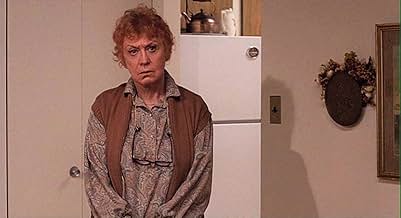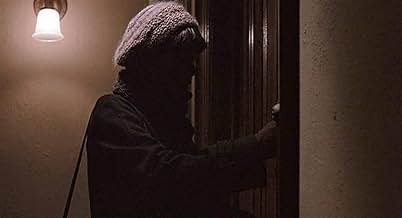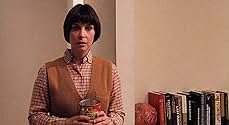AVALIAÇÃO DA IMDb
4,8/10
1 mil
SUA AVALIAÇÃO
Adicionar um enredo no seu idiomaA weird woman admires and spies on her shy mousy neighbor with a telescope.A weird woman admires and spies on her shy mousy neighbor with a telescope.A weird woman admires and spies on her shy mousy neighbor with a telescope.
- Prêmios
- 6 indicações no total
Joe Cortese
- Bob Luffrono
- (as Joseph Cortese)
Bette Davis
- Charlotte Vale
- (cenas de arquivo)
Avaliações em destaque
I've read the user reviews for this film, and some of them seem way too harsh. I understand Windows was critically bashed during its theatrical release and considered offensive to many viewers, but watching it today, it's not that bad. In fact, keeping an open mind as to how the characters interact with one another, it's at the very least interesting. Sure, there are plot holes the size of Manhattan, but this is a stylized thriller with beautiful photography at its core.
The story centers on a psycho named Andrea (Elizabeth Ashley) – who just happens to be a lesbian – infatuated with her timid neighbor Emily (Talia Shire). Andrea goes so far as to hire a creep named Obecny (Rick Petrucelli) to attack Emily and have the ordeal recorded. Andrea gets her kicks listening to the audio despite seeing a therapist. We soon learn that curing Andrea of her obsession may not be in the cards. What follows is Emily trying to cope and get on with her life while Andrea basically stalks and watches her through a telescope.
The film does drag a bit at times, but the climax certainly holds its own until the very end, where it just fizzles. However, I did scratch my head a couple of times in a good way by being perplexed as to what the intentions of the characters were. I also thought Ashley gave an unusual performance. Andrea was played as confused and sometimes volcanic, but with more subtlety, unlike an Alex Forrest (Fatal Attraction), for example. I think she should have been the focus of the film, giving Ashley more to work with and to create a deeper connection to the material. The acting was credible by the rest of the cast, especially Shire, who warms up to the role as the film progresses. Finally, the whole controversy over Andrea being a lesbian seems silly now. I mean, it's a character. We have all kinds of movies featuring different types of psychopaths relishing in various fetishes. Andrea just happened to be a lesbian whose obvious crush was going to be on another woman. Let's get over it already.
I wanted to see this film for over 30 years because of the controversy it spawned. Was it worth it? Yes and no. I didn't see it as controversial, but it did keep me watching until the end. Just watch the Syfy channel, and you'll see WAY more movies worse than this one in every respect, literally. If you do decide to see Windows, don't overanalyze it and remember this was the first and only directorial effort from the renowned cinematographer Gordon Willis.
The story centers on a psycho named Andrea (Elizabeth Ashley) – who just happens to be a lesbian – infatuated with her timid neighbor Emily (Talia Shire). Andrea goes so far as to hire a creep named Obecny (Rick Petrucelli) to attack Emily and have the ordeal recorded. Andrea gets her kicks listening to the audio despite seeing a therapist. We soon learn that curing Andrea of her obsession may not be in the cards. What follows is Emily trying to cope and get on with her life while Andrea basically stalks and watches her through a telescope.
The film does drag a bit at times, but the climax certainly holds its own until the very end, where it just fizzles. However, I did scratch my head a couple of times in a good way by being perplexed as to what the intentions of the characters were. I also thought Ashley gave an unusual performance. Andrea was played as confused and sometimes volcanic, but with more subtlety, unlike an Alex Forrest (Fatal Attraction), for example. I think she should have been the focus of the film, giving Ashley more to work with and to create a deeper connection to the material. The acting was credible by the rest of the cast, especially Shire, who warms up to the role as the film progresses. Finally, the whole controversy over Andrea being a lesbian seems silly now. I mean, it's a character. We have all kinds of movies featuring different types of psychopaths relishing in various fetishes. Andrea just happened to be a lesbian whose obvious crush was going to be on another woman. Let's get over it already.
I wanted to see this film for over 30 years because of the controversy it spawned. Was it worth it? Yes and no. I didn't see it as controversial, but it did keep me watching until the end. Just watch the Syfy channel, and you'll see WAY more movies worse than this one in every respect, literally. If you do decide to see Windows, don't overanalyze it and remember this was the first and only directorial effort from the renowned cinematographer Gordon Willis.
There are two reasons to watch this movie: Gordon Willis's cinematography & Elizabeth Ashley. It's not as lame as it is made out to be and has exquisite production values, but that being said, it is very niche, succeeding neither as a slasher nor a thriller, but occupying some odd space in between.
"Windows" also reminds us that you can be a great cinematographer but that doesn't necessarily translate to directing: in fact, Gordon Willis never directed another movie again. As far as Elizabeth Ashley, for those not acquainted she was sort of a Tallulah Bankhead of the 70s and 80s. She had a storied Broadway career and multiple husbands and was on The Tonight Show more than 20 times simply because Carson found her amusing. She is captivating, even in claptrap melodrama like this.
This movie was lambasted by the critics when it first came out, snuffing out Talia Shire's major studio leading lady career in the process. Shire had been a hot property after "The Godfather" and "Rocky" movies...but she made three high profile bombs in a row: "Old Boyfriends", "Prophecy", and, finally, "Windows." Film careers ending after a bomb or two happened to a lot of actresses back then and Shire was probably given more chances than most but the bottom line was she just couldn't carry a film.
The movie looks terrific. Ashley wears a series of shimmery Bloomingdales middle-aged Disco blouses and it is impossible not to look at her. She's very interesting as an actress. The city is shot like a lullaby...to Brooklyn (The Brooklyn Heights Promenade and Cher's Cranberry Street block in Moonstruck figure prominently, as does The River Café as well as Fulton Street near Brooklyn Bridge Park, or as it referred to in Windows: "River Street") and Pearl Street in Lower Manhattan. The use of locations is a wonder and everything is very desolate. It definitely creates a mood of unease.
Now, the problems. I don't have an issue with Shire's character, exactly. She is beyond mousey and nearly sexless, with her Prince Valiant hair and series of brown patterned sweater vests and plaid shirts worthy of an assistant librarian. She is certainly not someone one would expect Ashley to be obsessed with. Perhaps that is the point? But we'll never know because the entire story is underdeveloped. It seems to want to coast by on suspense but that is a flaw because there is hardly any suspense whatsoever. The film may have somewhat succeeded had it put some effort into characterizations. Instead we get some hints at what could have been and a choppy series of dull vignettes culminating in an anticlimactic showdown between Ashley and Shire. I do like that they don't spell everything out for you and, if you pause to think, the chain of events is coherent. But it's just not enough.
"Windows" could have been interesting. I think they were going for something akin to "let's make a women's picture about sexual obsession" but then lost their way. Ultimately, it is almost completely devoid of energy but a pleasure to look at and Ashley is always a treat to observe...even when she is wearing eyeglasses the size of dessert plates and stroking an enormous phallic telescope.
"Windows" also reminds us that you can be a great cinematographer but that doesn't necessarily translate to directing: in fact, Gordon Willis never directed another movie again. As far as Elizabeth Ashley, for those not acquainted she was sort of a Tallulah Bankhead of the 70s and 80s. She had a storied Broadway career and multiple husbands and was on The Tonight Show more than 20 times simply because Carson found her amusing. She is captivating, even in claptrap melodrama like this.
This movie was lambasted by the critics when it first came out, snuffing out Talia Shire's major studio leading lady career in the process. Shire had been a hot property after "The Godfather" and "Rocky" movies...but she made three high profile bombs in a row: "Old Boyfriends", "Prophecy", and, finally, "Windows." Film careers ending after a bomb or two happened to a lot of actresses back then and Shire was probably given more chances than most but the bottom line was she just couldn't carry a film.
The movie looks terrific. Ashley wears a series of shimmery Bloomingdales middle-aged Disco blouses and it is impossible not to look at her. She's very interesting as an actress. The city is shot like a lullaby...to Brooklyn (The Brooklyn Heights Promenade and Cher's Cranberry Street block in Moonstruck figure prominently, as does The River Café as well as Fulton Street near Brooklyn Bridge Park, or as it referred to in Windows: "River Street") and Pearl Street in Lower Manhattan. The use of locations is a wonder and everything is very desolate. It definitely creates a mood of unease.
Now, the problems. I don't have an issue with Shire's character, exactly. She is beyond mousey and nearly sexless, with her Prince Valiant hair and series of brown patterned sweater vests and plaid shirts worthy of an assistant librarian. She is certainly not someone one would expect Ashley to be obsessed with. Perhaps that is the point? But we'll never know because the entire story is underdeveloped. It seems to want to coast by on suspense but that is a flaw because there is hardly any suspense whatsoever. The film may have somewhat succeeded had it put some effort into characterizations. Instead we get some hints at what could have been and a choppy series of dull vignettes culminating in an anticlimactic showdown between Ashley and Shire. I do like that they don't spell everything out for you and, if you pause to think, the chain of events is coherent. But it's just not enough.
"Windows" could have been interesting. I think they were going for something akin to "let's make a women's picture about sexual obsession" but then lost their way. Ultimately, it is almost completely devoid of energy but a pleasure to look at and Ashley is always a treat to observe...even when she is wearing eyeglasses the size of dessert plates and stroking an enormous phallic telescope.
WINDOWS (1980) */****
One of the all-time worst films I've ever seen. It's been 25 years since I saw this in a tiny theatre and simultaneously watched it vanish from history without a trace. This recent second viewing via a VHS dupe from some unknown source did not improve things much, but I've got a story to tell about this movie and how it's eluded me for such a very long time. This has become almost a "lost" film, and I'll have a theory later as to why nobody's seeing it anymore, aside from the basic fact that it simply stinks.
In 1980 I was 17 and went to see WINDOWS at the movies with my kid sister. It was only one of the two times in my life I ever recall going to a theatre with her, and we were both in shock at just how abysmal the feature before our eyes was. It was boring, badly acted, and by the final act, completely laughable. The whole theatre was in hysterics. It's not the kind of experience you forget when you're a movie fan, even 25 years after the fact.
The movie starts in its New York City setting with lousy actress Talia Shire (who apparently thinks she's still playing the timid Adrian from the first ROCKY film) being assaulted and raped in her own apartment, getting forced at knifepoint to moan and groan into the attacker's tape recorder. We later discover (and since it's not presented as any kind of mystery I'm not ruining anything that hasn't already been ruined) that Shire's got a psychotic and horny lesbian neighbor (Elizabeth Ashley) across the hall who's so in love with her that Ashley actually hired this rapist/goon to pull off the crime - so she can play the tape over and over and get off on it to her heart's content.
When Talia decides to move to a nicer apartment to start anew, Elizabeth and her loose screws aren't very far behind. She'll do anything to make Talia love her, as her ineffective psychiatrist seems to be aware. Enter vapid policeman Joseph Cortese (who's about as interesting as a door stop) to romance Shire (what the hell do Ashley and Cortese see in her insipid character anyway?) and "help" her ... in an unbelievable sequence, Shire is in a cab with a driver whom she recognizes as the rapist; she asks to be let off at a phone booth, calls the police, but is instructed to get back in the car with her attacker till the cops can get to them!
Besides being ineptly acted, WINDOWS is also dull and boring, but there's something curiously watchable about it for fans of bad movies only, for all its incompetence. It was the first and only film (no wonder) to be directed by cinematographer Gordon Willis; it was his photography that graced THE GODFATHER and some of Woody Allen's picturesque movies, so his shots of New York may be the one thing to watch for here, aside from getting a load of Elizabeth Ashley's embarrassing climax with Talia Shire. This film is also notorious as being the very FIRST film to be released in the entire decade of the 1980's, and of course as of this writing it's a movie that is virtually impossible to locate, as it was never released on home video except in France (I believe). It was through the wonders of the Internet that I was able to hunt this thing down and see how bad it still is.
So why has this film been so hard to track down? Well, for starters, it's got to be a humiliation to everyone involved. I'm fairly positive it's owned by Warner Brothers, and my personal opinion is that, in this Politically Correct world of today, we just cannot have a film available that depicts a homicidal maniac when she also happens to be a lesbian. But that in itself has made the movie all the more desirable for a viewing, and it's at the very least a reminder of the type of movies filmmakers used to be allowed to make. Proceed at your own risk -- if you can ever find a copy, that is.
One of the all-time worst films I've ever seen. It's been 25 years since I saw this in a tiny theatre and simultaneously watched it vanish from history without a trace. This recent second viewing via a VHS dupe from some unknown source did not improve things much, but I've got a story to tell about this movie and how it's eluded me for such a very long time. This has become almost a "lost" film, and I'll have a theory later as to why nobody's seeing it anymore, aside from the basic fact that it simply stinks.
In 1980 I was 17 and went to see WINDOWS at the movies with my kid sister. It was only one of the two times in my life I ever recall going to a theatre with her, and we were both in shock at just how abysmal the feature before our eyes was. It was boring, badly acted, and by the final act, completely laughable. The whole theatre was in hysterics. It's not the kind of experience you forget when you're a movie fan, even 25 years after the fact.
The movie starts in its New York City setting with lousy actress Talia Shire (who apparently thinks she's still playing the timid Adrian from the first ROCKY film) being assaulted and raped in her own apartment, getting forced at knifepoint to moan and groan into the attacker's tape recorder. We later discover (and since it's not presented as any kind of mystery I'm not ruining anything that hasn't already been ruined) that Shire's got a psychotic and horny lesbian neighbor (Elizabeth Ashley) across the hall who's so in love with her that Ashley actually hired this rapist/goon to pull off the crime - so she can play the tape over and over and get off on it to her heart's content.
When Talia decides to move to a nicer apartment to start anew, Elizabeth and her loose screws aren't very far behind. She'll do anything to make Talia love her, as her ineffective psychiatrist seems to be aware. Enter vapid policeman Joseph Cortese (who's about as interesting as a door stop) to romance Shire (what the hell do Ashley and Cortese see in her insipid character anyway?) and "help" her ... in an unbelievable sequence, Shire is in a cab with a driver whom she recognizes as the rapist; she asks to be let off at a phone booth, calls the police, but is instructed to get back in the car with her attacker till the cops can get to them!
Besides being ineptly acted, WINDOWS is also dull and boring, but there's something curiously watchable about it for fans of bad movies only, for all its incompetence. It was the first and only film (no wonder) to be directed by cinematographer Gordon Willis; it was his photography that graced THE GODFATHER and some of Woody Allen's picturesque movies, so his shots of New York may be the one thing to watch for here, aside from getting a load of Elizabeth Ashley's embarrassing climax with Talia Shire. This film is also notorious as being the very FIRST film to be released in the entire decade of the 1980's, and of course as of this writing it's a movie that is virtually impossible to locate, as it was never released on home video except in France (I believe). It was through the wonders of the Internet that I was able to hunt this thing down and see how bad it still is.
So why has this film been so hard to track down? Well, for starters, it's got to be a humiliation to everyone involved. I'm fairly positive it's owned by Warner Brothers, and my personal opinion is that, in this Politically Correct world of today, we just cannot have a film available that depicts a homicidal maniac when she also happens to be a lesbian. But that in itself has made the movie all the more desirable for a viewing, and it's at the very least a reminder of the type of movies filmmakers used to be allowed to make. Proceed at your own risk -- if you can ever find a copy, that is.
WINDOWS reminds me of REFLECTIONS IN A GOLDEN EYE. When REFLECTIONS came out in 1967, it had the book thrown at it for being deviant, sick, perverse, reactionary, offensive, pretentious (which is such a mouthful that it makes one believe that the hater(s)doth protest too much). On top of these epithets, was the final body blow, and "just plain boring." It's difficult to be all of the above and be "just plain boring" to boot which is the reason I was compelled to check out both movies. I'm glad I did. WINDOWS is not the outright triumph REFLECTIONS IN A GOLDEN EYE is, but it's thoughtful and original about something that shouldn't be dismissed by film lovers out of court. It's not sleazy or exploitative; as a matter of fact, that's a major problem with it. It refuses to further sensationalize its wildly lurid "givens." It's artful enough in its intentions to try to suggest that the tragedy of urban life is not the violence of melodramatic evil, but the glass cubicles people live in that link and separate them in devastatingly emotional ways. Gordon Willis' direction is typical of a first time director. It suffers from being too studied but it's far from daft or moronic; visually, it's as thought through as REAR WINDOW, its obvious predecessor in voyeurism. But there's nothing in REAR WINDOW, as seriously naked and exposed as Elizabeth Ashley's performance. It's interesting that when great actors like Brando (in REFLECTIONS IN A GOLDEN EYE), and Ashley in WINDOWS attempt something that goes beyond the average viewer's opinion of how a homosexual SHOULD be portrayed, there's is an automatic reflex action on the part of said viewer to distance themselves from the performance, to laugh at it or automatically dismiss it as being "over the top." This response is, in fact, more reactionary than the sins that have been dumped in the picture's lap. WINDOWS is not as dumb or insensitive as the knee jerk response it provokes in most people who feign an interest in the dark side until it becomes too real.
This is one of those flicks I've wanted to see since it came out (I was underage at the time). The plot just sounded very freaky and bizarre. Regardless, it is one of the THE most impossible films to find since I don't believe it got a video release (except overseas) and I don't even think it played on cable in the '80s. It is however on YouTube now :-).
This film gets trashed by a lot of people immediately as being non-PC and homophobic. I think that's more a signpost of when the film was released, when attitudes toward people with other orientations weren't so enlightened.
No, the core problem behind this picture is that it's just a raving, stinking mess, and it really is virtually all Willis' fault. When you read the opening credits, your jaw drops...they read like an A-list of movie greats: Morricone, Bourne, Willis as DP. How could they screw this up? Easy. A) Don't build any suspense; B) Don't establish any characters or motivations; C) Allow the writer to write any damn thing he wants to, no matter how stupid or no matter what expense to the actors; D) Resort to constant dissolves when you don't know what else to do, especially since there is virtually no coherent action; E) Don't direct your actors...after all they're pros, they know exactly what to do. The list goes on....
This is a stalker movie....it should be about stalking. There is absolutely no fear built, no tension. It's a real master class in wasted celluloid.
Still, part of me has to admire this in a way you sometimes admire any bad movie. It sure didn't have any self-censoring going on. it did what it wanted to do and took no prisoners. One of the many things that makes it a museum piece today, even if that museum is a wax one.
This film gets trashed by a lot of people immediately as being non-PC and homophobic. I think that's more a signpost of when the film was released, when attitudes toward people with other orientations weren't so enlightened.
No, the core problem behind this picture is that it's just a raving, stinking mess, and it really is virtually all Willis' fault. When you read the opening credits, your jaw drops...they read like an A-list of movie greats: Morricone, Bourne, Willis as DP. How could they screw this up? Easy. A) Don't build any suspense; B) Don't establish any characters or motivations; C) Allow the writer to write any damn thing he wants to, no matter how stupid or no matter what expense to the actors; D) Resort to constant dissolves when you don't know what else to do, especially since there is virtually no coherent action; E) Don't direct your actors...after all they're pros, they know exactly what to do. The list goes on....
This is a stalker movie....it should be about stalking. There is absolutely no fear built, no tension. It's a real master class in wasted celluloid.
Still, part of me has to admire this in a way you sometimes admire any bad movie. It sure didn't have any self-censoring going on. it did what it wanted to do and took no prisoners. One of the many things that makes it a museum piece today, even if that museum is a wax one.
Você sabia?
- CuriosidadesReleased in theaters roughly one month before Cruising (1980), another film that was protested by gay rights activists for portrayals some deemed homophobic and hateful stereotypes.
- Citações
Andrea Glassen: Please... don't hurt me. Please... don't hurt me. *Please*... don't hurt me. Please... don't hurt me. Don't hurt me. Please. Please. Please don't hurt me. Please don't hurt me. Please don't hurt me. Please don't hurt me. Please.
- Versões alternativasUK cinema and video versions were heavily cut by 2 minutes 16 secs by the BBFC to edit the opening rape scene.
- ConexõesFeatured in Sneak Previews: Windows/Heart Beat/The Runner Stumbles/Rape of Love (1980)
Principais escolhas
Faça login para avaliar e ver a lista de recomendações personalizadas
- How long is Windows?Fornecido pela Alexa
Detalhes
- Data de lançamento
- País de origem
- Idioma
- Também conhecido como
- Windows
- Locações de filme
- 9 Cranberry Street, Brooklyn Heights, Brooklyn, Nova Iorque, Nova Iorque, EUA(Emily and Andrea's first apartment building)
- Empresa de produção
- Consulte mais créditos da empresa na IMDbPro
Bilheteria
- Faturamento bruto nos EUA e Canadá
- US$ 2.128.395
- Fim de semana de estreia nos EUA e Canadá
- US$ 311.796
- 20 de jan. de 1980
- Faturamento bruto mundial
- US$ 2.128.395
Contribua para esta página
Sugerir uma alteração ou adicionar conteúdo ausente

Principal brecha
By what name was Maldita Paixão (1980) officially released in India in English?
Responda


